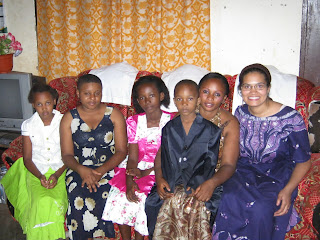Today I saw my life flash before my eyes! I love adrenaline rushes, but only in controlled settings and my heart is still racing from what happened today….
I will start from the beginning. First, I should tell you that I live in the Mbeya region which is absolutely beautiful. Mbeya is filled with mountains and my village is at the base of the mountain they refer to as “snake mountain.” According to my Second Master, they call this “mlima nyoka,” or "snake mountain," because the road winds through it like a snake. There is one narrow road with many twists and turns. If there were actual lanes I would say that it was a two lane road, but a more accurate description would be that there are cars going in both directions. They generally stay to one side or the other, but sometimes the drivers like to switch it up or drive down the middle of the road. The important note here is that this one road takes you from my village up the mountain to Mbeya town. Now I had not planned to go to the main town of Mbeya today, I was actually supposed to attend a religious graduation that was being held at our school. Unfortunately, I had an emergency situation that required me to go to town and immediately buy a plunger. The details are far too embarrassing for me to write online, but I honestly think God uses my life for comedic entertainment. Needless to say, this was not the relaxing Saturday I had imagined.
One of my students was going to town as well, so he helped me find a plunger (there is not really a word for it in Kiswahili and most people do not have Western toilets so this search was an experience in itself). After we completed this task, I treated him to pizza at a restaurant in town then we split up so I could buy some groceries and see another PCV who lives in town. He went to see his brother and uncle, then we met up to ride back to our village together. And this is where my true adventure began. I wanted to buy some oranges (machungwa) in a town called Uyole on our way back, so we had to take a dala (small van) from Mbeya to Uyole and another one from Uyole to our village. The stop and journey to Uyole was fine, the only annoyance was that vendors always add the mzungu sales tax and my Peace Corps salary does not allow for the inflated prices. In other words, Tanzanians think I am rich and white so even though I make less than $8 a day, they try to swindle me. But I am digressing…my attempt at creating suspense is clearly turning into rambling.
After I bought my oranges my student and I boarded the dala from Uyole to our village. The driver drove very fast through the mountains and we were making good time. Then, as we approached the top of one of the mountains, the van gave out. It started sliding backwards and there was smoke. After several attempts to restart the engine and get the van up the mountain, the passengers decided to get out. After the dala was emptied, they were able to drive it over the hill and stop at a minor plateau. So we, the passengers, got to hike up the hill to meet the van. The driver told all of the passengers to get back inside, and I assumed that they had fixed the problem. Never make assumptions! Especially when you live in another country and the driver is motivated by money not safety. We all get in the van and start driving. I notice there is smoke rising from the car (not outside, literally rising from the middle of the car). Then I notice that the brakes still aren’t working well and whatever problem the dala had was clearly not fixed. I asked my student if it was a good idea for us to be riding in this van since it was smoking, and he explained that it was very hard to get another van to come especially since it was almost sunset. When I told him that the brakes didn’t seem to be working well, he said, “Don’t worry. The driver put the car in neutral.” Now I am not an expert mountain driver by any means, but I am pretty sure that you aren’t supposed to put the vehicle in neutral when you are driving down a STEEP mountain with many turns and bad breaks. But what do I know. So then I asked my student what he thought we should do, and he told me to pray.
As the van was weaving between cars, driving on the wrong side of the road, speeding through curves, and accelerating to an unsafe rate down the mountain, God and I had an intimate conversation. And I am thankful that He loves me so much! Fortunately, we made it back to our village safely and the dala driver avoided a major accident. On our walk back to the school, my student admitted that he was scared too. He was just trying to act like it was no big deal for my sake…



























